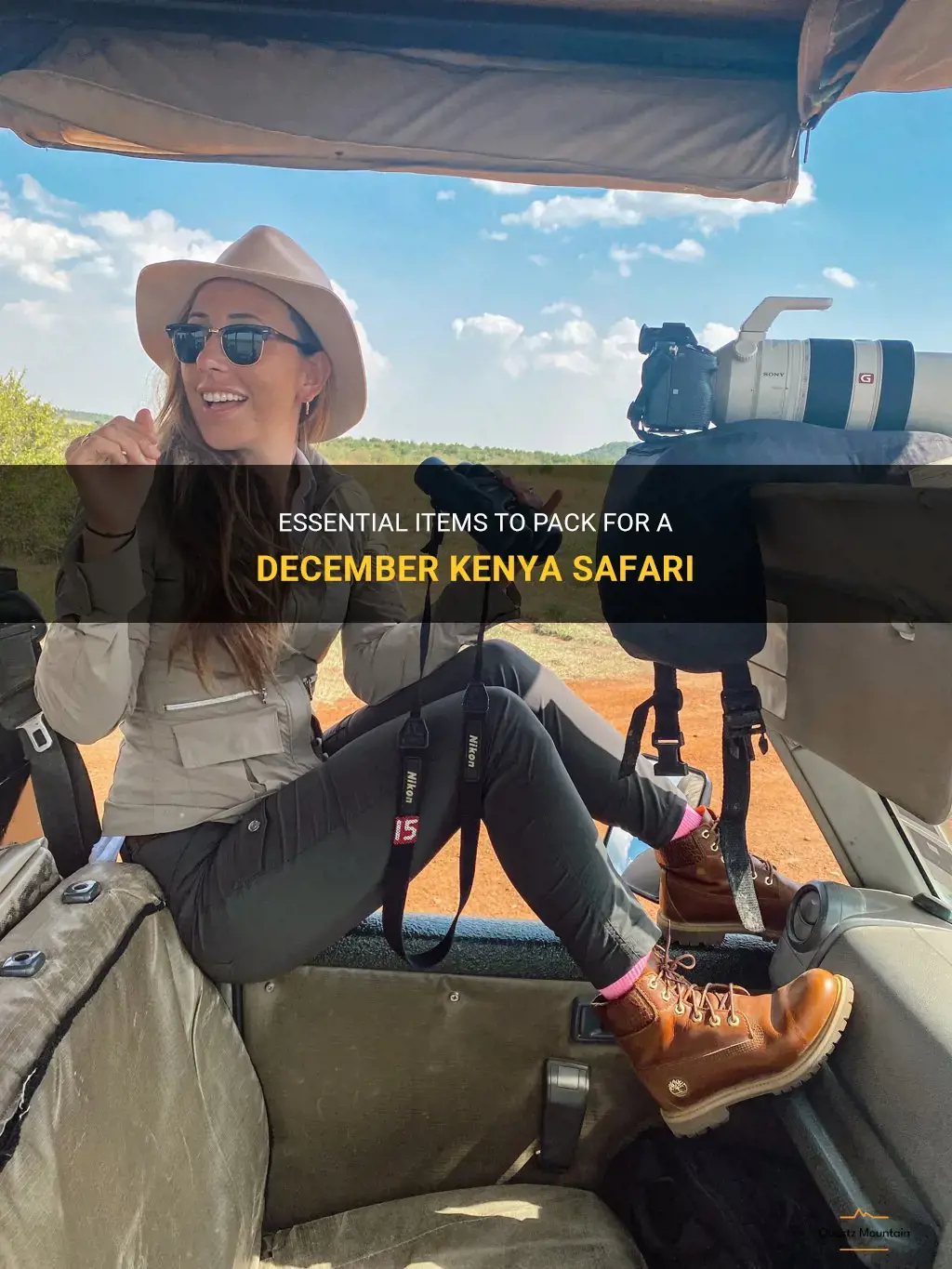
Embarking on a Kenya safari in December is an adventure like no other, as this vibrant African country comes alive with an abundance of wildlife and stunning landscapes. However, to truly make the most of your safari experience, it is essential to come well-prepared with the right gear and essentials. From lightweight clothing to protect against the African sun, to sturdy footwear for trekking through rugged terrains, this guide will highlight the essential items to pack for a December Kenya safari. As you venture into the wilderness, you'll be fully equipped to capture breathtaking moments and create memories that will last a lifetime.
| Characteristics | Values |
|---|---|
| Weather | Warm during the day |
| Cool in the evenings | |
| Clothing | Lightweight and breathable |
| T-shirts and shorts | |
| Long-sleeved shirts and pants | |
| Sweater or jacket for evenings | |
| Hat and sunglasses | |
| Comfortable walking shoes | |
| Swimsuit for swimming | |
| Rain jacket or umbrella | |
| Health | Insect repellent |
| Malaria prophylaxis | |
| Sunscreen | |
| First aid kit | |
| Prescription medications | |
| Travel insurance | |
| Technology | Camera |
| Binoculars | |
| Charger and power adapter | |
| Portable phone charger | |
| Accessories | Backpack or daypack |
| Money and travel documents | |
| Water bottle | |
| Snacks | |
| Travel pillow | |
| Travel guidebook |
What You'll Learn
- What clothing items should I pack for a December Kenya safari?
- Are there any specific accessories or equipment that I should bring for a December Kenya safari?
- Should I pack any specific insect repellent or sunscreen for a December Kenya safari?
- Are there any essential toiletries or medications that I should include in my packing list for a December Kenya safari?
- Are there any cultural considerations or clothing restrictions that I should be aware of when packing for a December Kenya safari?

What clothing items should I pack for a December Kenya safari?
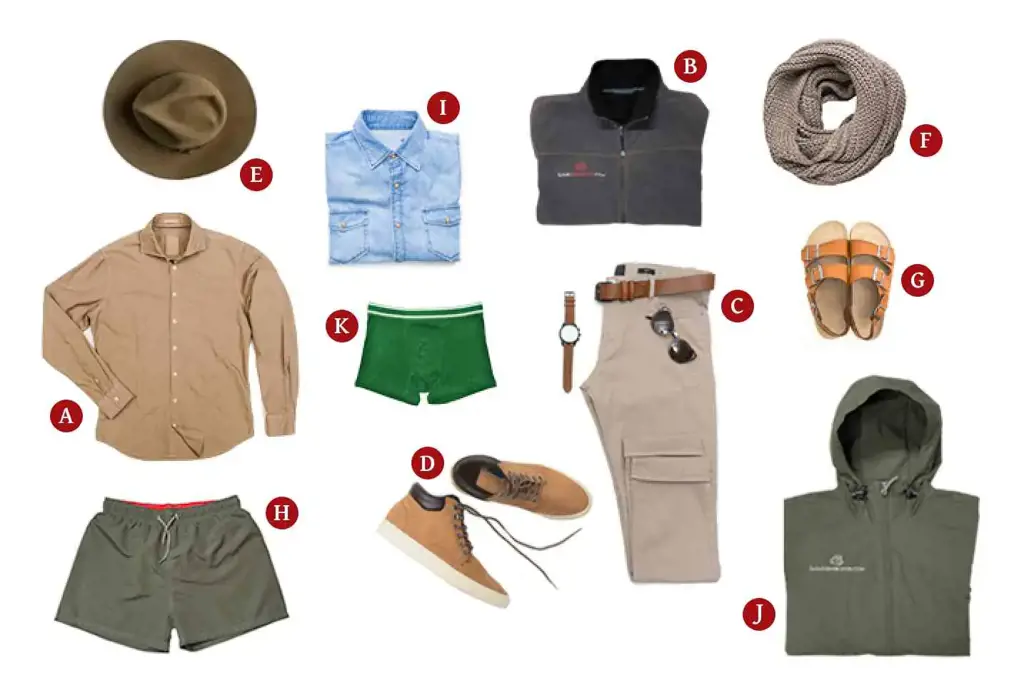
If you're planning a Kenya safari in December, it's important to pack the right clothing to ensure your comfort and safety. December falls during the dry season in Kenya, which means that temperatures can be hot during the day but cool down significantly at night. Here are some clothing items you should consider packing for your December safari:
- Lightweight, breathable clothing: As temperatures can be quite hot during the day, it's important to pack clothing made from lightweight and breathable materials such as cotton or linen. Opt for loose-fitting long-sleeve shirts and pants to protect your skin from the harsh sun and potential mosquito bites.
- Sun hat and sunglasses: The African sun can be intense, so don't forget to pack a wide-brimmed sun hat and sunglasses to protect your face and eyes from the strong UV rays. Make sure to choose a hat with a chin strap to prevent it from blowing off in the safari vehicle.
- Warm layers for the evenings: While it may be hot during the day, temperatures can drop significantly in the evenings, especially in higher altitude areas. Pack a lightweight but warm jacket or sweater to layer over your daytime clothing to keep you warm during night game drives or campfires.
- Comfortable walking shoes: Kenya safaris often involve walking or hiking, so it's crucial to pack comfortable shoes. Opt for closed-toe shoes with good grip to protect your feet from rocks, insects, and thorny vegetation. Make sure to break them in before your trip to avoid blisters.
- Swimwear: Many lodges and camps in Kenya have swimming pools or offer swimming opportunities in nearby natural bodies of water. Don't forget to pack your swimwear so you can cool off and relax during your downtime.
- Neutral-colored clothing: To blend in with the natural surroundings and minimize disturbances to wildlife, it's best to pack neutral-colored clothing such as khaki, beige, or olive green. Bright colors and patterns can attract insects or scare away animals, so it's best to avoid them.
- Rain gear: While December is part of the dry season in Kenya, it's always recommended to pack rain gear such as a lightweight rain jacket or poncho. Weather conditions can be unpredictable, and a sudden rain shower can occur. It's better to be prepared than caught off guard without proper protection.
Remember to also check the specific requirements and recommendations of the lodges or safari tour company you'll be staying with. They may have additional guidelines or restrictions on clothing to ensure the safety and comfort of all guests. By packing the right clothing items for your December safari in Kenya, you'll be able to fully enjoy the wildlife and natural beauty of the country while staying comfortable and protected throughout your trip.
The Ultimate Packing Guide for an Incredible Month of Backpacking in Thailand
You may want to see also

Are there any specific accessories or equipment that I should bring for a December Kenya safari?
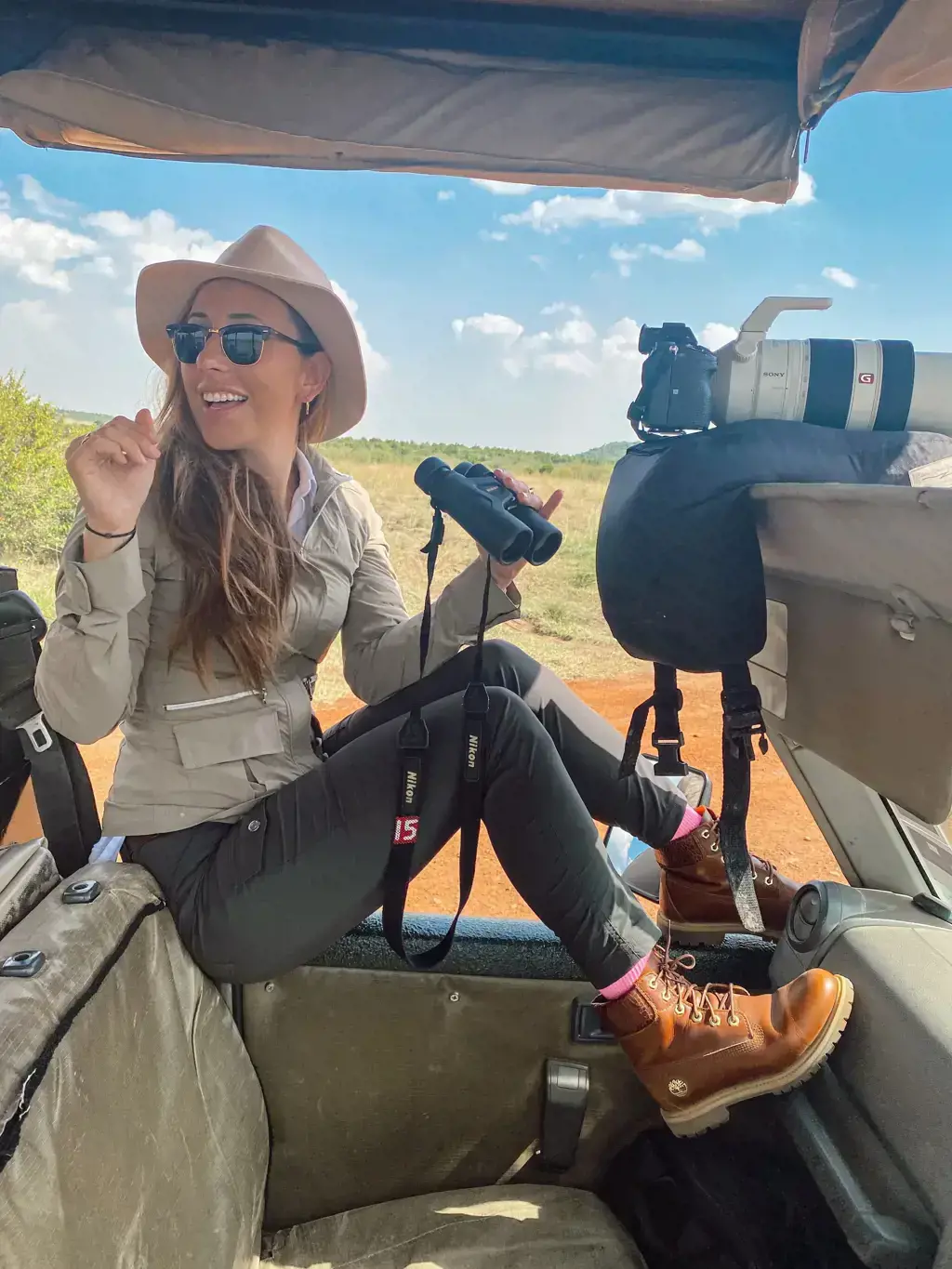
Planning a safari in Kenya for December can be an incredibly exciting and rewarding experience. However, it's important to come prepared with the right accessories and equipment to ensure a smooth and enjoyable trip. Here are some specific items that you should consider bringing along:
- Binoculars: A good pair of binoculars is essential for wildlife viewing. December is a great time to spot animals in Kenya's national parks, and having binoculars will allow you to get a closer look at them without disturbing them.
- Camera and lenses: December is a popular time for wildlife photography in Kenya, so it's a good idea to bring a camera with a telephoto lens. This will allow you to capture stunning close-ups of the animals you encounter.
- Insect repellent: Mosquitoes and other insects can be a nuisance in Kenya, especially during the rainy season. It's important to bring insect repellent to protect yourself from bites and potential diseases.
- Sun protection: December is summer in Kenya, and the sun can be intense. Make sure to bring sunscreen, a hat, sunglasses, and lightweight, long-sleeved clothing to protect yourself from the sun's rays.
- Comfortable walking shoes: A safari often involves walking or hiking in the bush, so it's important to have comfortable shoes that can handle uneven terrain. Opt for closed-toe shoes to protect your feet from thorns and other hazards.
- A good backpack: A sturdy backpack is essential for carrying your belongings during the safari. Look for one with multiple compartments to keep your gear organized and easily accessible.
- Portable charger: It's important to have a portable charger for your electronics, such as cameras and smartphones. This will ensure that you don't miss any photo opportunities due to a dead battery.
- Travel adaptor: Kenya uses type G sockets, so it's important to bring a travel adaptor to charge your electronic devices.
- Medical kit: It's always a good idea to bring a basic medical kit with essentials such as band-aids, antiseptic wipes, painkillers, and any necessary prescription medications.
- Reusable water bottle: Staying hydrated is crucial during a safari, so bring a reusable water bottle that you can fill up at your accommodations or from purified water sources.
These are just a few of the specific accessories and equipment that you should consider bringing for a December Kenya safari. Remember to check the weather conditions and the specific requirements of your tour operator beforehand to ensure you have everything you need for a successful and enjoyable trip.
In summary, a December safari in Kenya can be a fantastic experience, but it's important to come prepared with the right accessories and equipment. Bringing binoculars, a camera and lenses, insect repellent, sun protection, comfortable walking shoes, a good backpack, a portable charger, a travel adaptor, a medical kit, and a reusable water bottle will help ensure that you have a safe and enjoyable safari experience.
Essential Tips for Backpacking Europe: What to Pack for an Unforgettable Adventure
You may want to see also

Should I pack any specific insect repellent or sunscreen for a December Kenya safari?
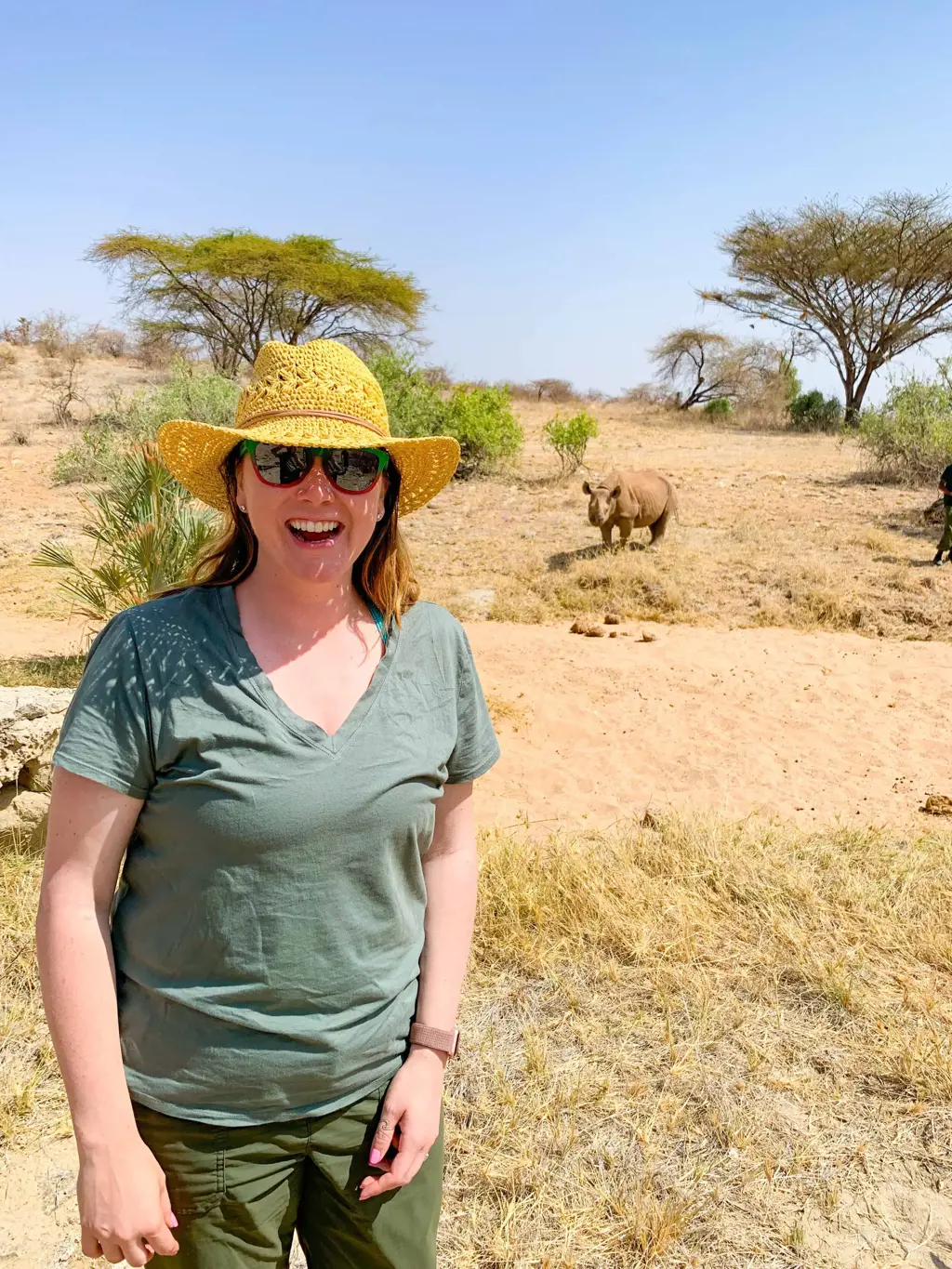
When preparing for a December safari in Kenya, it is essential to pack the appropriate insect repellent and sunscreen to ensure a safe and enjoyable experience. The climate in Kenya during December is generally hot and dry, with the possibility of occasional showers. This weather creates the perfect breeding ground for insects, so it is crucial to protect yourself from bites and potential diseases.
Insects, such as mosquitoes, can transmit diseases like malaria, dengue fever, and chikungunya. It is therefore essential to use an insect repellent that contains at least 20-30% DEET (N,N-diethyl-meta-toluamide). DEET is the most effective ingredient for repelling mosquitoes and other biting insects. Make sure to apply the repellent to all exposed areas of your body, including your face and neck.
It is worth mentioning that some mosquitoes in Kenya are active during the evening and night, so it is advisable to wear long-sleeved shirts, long pants, and closed-toe shoes during those times. Additionally, consider sleeping under a mosquito net or staying in accommodations that have proper screens and air conditioning.
While protecting yourself from insect bites is essential, it is equally important to safeguard your skin from the scorching African sun. Kenya is located near the equator, and the sun's rays can be intense, causing sunburn and long-term damage to the skin.
Therefore, packing a high SPF (Sun Protection Factor) sunscreen is crucial. Look for a broad-spectrum sunscreen with an SPF of 30 or higher. Apply the sunscreen generously to all exposed skin, and remember to reapply every two hours, especially if you are sweating or swimming. Additionally, consider wearing a wide-brimmed hat, sunglasses, and lightweight, breathable clothing to provide further protection from the sun.
When choosing your sunscreen, it is important to select a brand that is labelled "reef safe" or "ocean-friendly." Traditional sunscreens often contain harmful chemicals that can damage coral reefs and marine life when washed off in bodies of water. By opting for reef-safe sunscreens, you can help protect the delicate ecosystems of Kenya's coastal areas and marine parks.
In addition to insect repellent and sunscreen, it is advisable to pack other essentials for your Kenya safari. These may include a hat, sunglasses, comfortable walking shoes, lightweight and breathable clothing, a reusable water bottle, a first-aid kit, and any necessary medications.
Remember to check with your healthcare provider for any required vaccinations or preventive medications before traveling to Kenya. They will be able to provide you with specific recommendations based on your medical history and the areas you plan to visit.
In conclusion, packing the appropriate insect repellent and sunscreen is crucial for a December safari in Kenya. By taking these measures, you can protect yourself from insect bites and potential diseases, as well as safeguard your skin from the African sun. Remember to choose an insect repellent with at least 20-30% DEET and a sunscreen with a high SPF, and ensure they are applied correctly and reapplied as needed. By prioritizing safety and protection, you can fully enjoy your safari adventure in Kenya.
Choosing the Perfect Attire for Working in a Food Packaging Manufacturing Industry
You may want to see also

Are there any essential toiletries or medications that I should include in my packing list for a December Kenya safari?
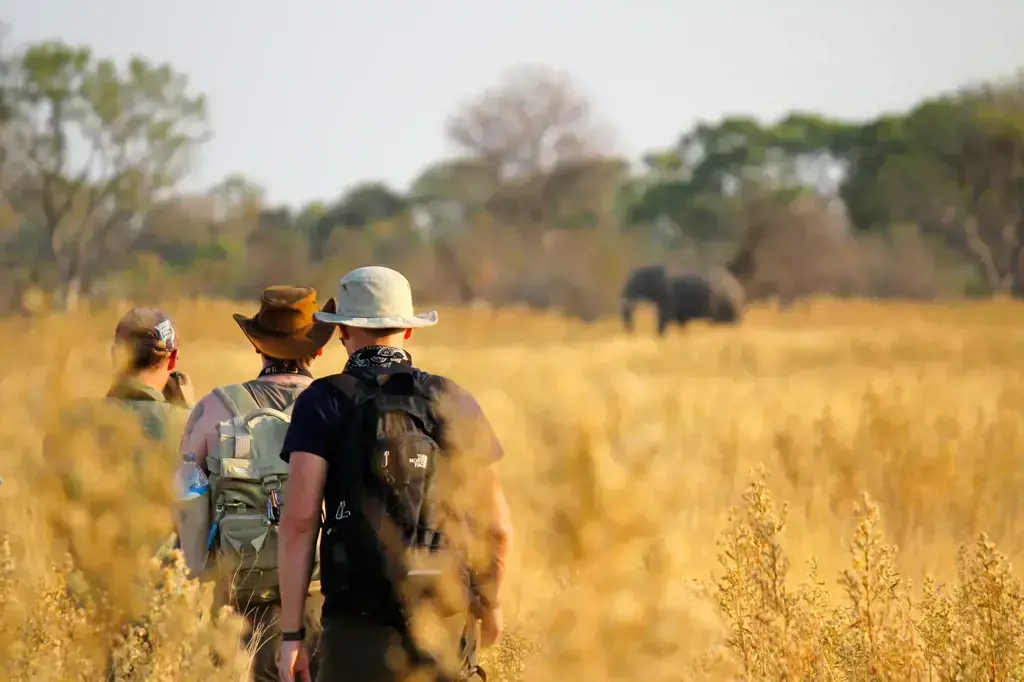
When packing for a December Kenya safari, it is important to make sure you have all the necessary toiletries and medications to ensure a comfortable and safe trip. While the specific items you may need can vary depending on your personal needs and preferences, there are some essentials that you should consider including in your packing list.
Toiletries:
- Sunscreen: December is the start of the dry season in Kenya, and the sun can be intense. It is important to protect your skin from the harmful rays of the sun by using a high SPF sunscreen.
- Insect repellent: Kenya is known for its diverse wildlife, including mosquitos. To prevent insect bites and the risk of mosquito-borne diseases, such as malaria, it is crucial to bring a good insect repellent containing DEET.
- Hand sanitizer: While on a safari, you may not always have access to clean water and soap. Having a small bottle of hand sanitizer will help you keep your hands clean and free from germs.
- Wet wipes: Wet wipes are handy for refreshing yourself, especially when you are traveling in a place where running water is not readily available.
- Lip balm: The dry climate of Kenya can cause your lips to become dry and chapped. Packing a good lip balm will help keep your lips moisturized.
Medications:
- Anti-malarial medication: Malaria is a prevalent disease in Kenya, especially in certain regions. It is recommended to take anti-malarial medication before, during, and after your trip to protect yourself from this potentially life-threatening disease. Consult with your healthcare provider or a travel clinic for the most appropriate medication and dosage for your specific circumstances.
- Prescription medications: If you take any prescription medications, make sure to pack an adequate supply for the duration of your trip. Check with your doctor if you need any additional prescriptions or information for traveling to Kenya.
- Motion sickness medication: If you are prone to motion sickness, especially during long drives on bumpy safari roads, consider packing motion sickness medication to make your journey more comfortable.
- Pain relievers: Headaches and muscle pain can occur during your safari, especially if you are not used to the climate or physical activities involved. Packing over-the-counter pain relievers, such as acetaminophen or ibuprofen, can help alleviate any discomfort.
- Antidiarrheal medication: Traveler's diarrhea can be common when visiting new countries. Packing antidiarrheal medication, such as loperamide, can help provide relief if you experience any gastrointestinal issues.
Remember, it is essential to consult with your healthcare provider or a travel clinic before your trip to discuss necessary vaccinations, medications, and any specific health concerns you may have. They will provide you with the most up-to-date information and recommendations based on your individual needs.
In conclusion, when packing for a December Kenya safari, it is crucial to include toiletries such as sunscreen, insect repellent, hand sanitizer, wet wipes, and lip balm. Additionally, don't forget to pack essential medications like anti-malarial medication, prescription medications, motion sickness medication, pain relievers, and antidiarrheal medication. By being prepared with these essential items, you can ensure a safe and enjoyable safari experience in Kenya.
What to Pack for a 3-Mile Day Hike with a Daypack
You may want to see also

Are there any cultural considerations or clothing restrictions that I should be aware of when packing for a December Kenya safari?
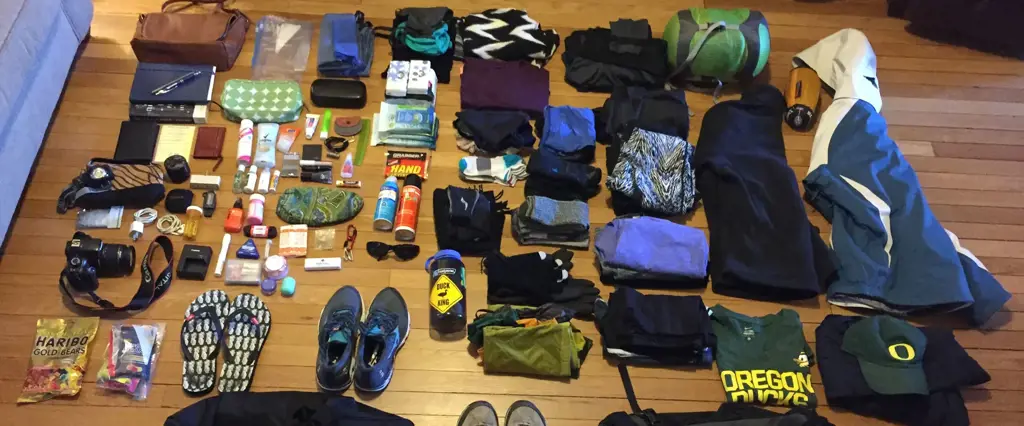
When packing for a December Kenya safari, it is important to take into consideration the cultural norms and clothing restrictions of the country. Kenya is a diverse nation with multiple tribal communities, each with their own unique customs and traditions. It is important to respect and adhere to these cultural norms when visiting the country.
One of the most important clothing considerations in Kenya is modesty. Kenyans generally have conservative views when it comes to clothing, especially in rural areas and among tribal communities. Women, in particular, are expected to dress modestly, covering their shoulders and legs. It is recommended to pack lightweight, loose-fitting clothing that covers these areas, such as long skirts or pants and tops with sleeves. Additionally, it is important to avoid revealing or tight-fitting clothing, as this may be considered inappropriate. Wearing a scarf or shawl can also be useful for covering up when necessary.
Another important consideration is the weather. December is during the hot and dry season in Kenya, so it is essential to pack light and breathable clothing. Opt for materials such as cotton or linen that allow air circulation and help to keep you cool. It is also a good idea to pack a wide-brimmed hat and sunglasses to protect yourself from the strong sun, as well as sunscreen with a high SPF. Don't forget to bring a lightweight jacket or sweater for cooler evenings, especially if you plan on visiting higher-altitude regions such as the Maasai Mara.
In addition to clothing, there are also a few cultural considerations to keep in mind. Kenya is a conservative country, and it is important to show respect for the local customs and traditions. Avoid public displays of affection, as this may be seen as inappropriate. It is also important to be mindful of local religious practices and beliefs. For example, if visiting a mosque or a traditional Maasai village, it is important to dress respectfully and follow any specific guidelines or rules.
When it comes to footwear, it is important to pack comfortable and sturdy shoes. Many safaris in Kenya involve walking or hiking, so you will want to have footwear that can handle the terrain. Good walking shoes or light hiking boots are recommended. It is also a good idea to bring a pair of sandals or flip-flops for when you are not on safari.
Finally, it is important to pack a few practical items for your Kenya safari. These may include insect repellent, a first aid kit, a flashlight, and a power adapter for your electronics. It is also a good idea to bring a refillable water bottle and some water purification tablets, as it is important to stay hydrated and avoid drinking tap water.
In conclusion, when packing for a December Kenya safari, it is important to consider the cultural norms and clothing restrictions of the country. Dress modestly, especially in rural areas and among tribal communities, and make sure to pack lightweight, breathable clothing that covers your shoulders and legs. Consider the weather and pack accordingly, including a wide-brimmed hat, sunglasses, and sunscreen. Show respect for local customs and traditions, and be mindful of local religious practices. Pack comfortable and sturdy shoes for walking or hiking, and don't forget practical items such as insect repellent and a first aid kit. By being prepared and respectful, you can have a memorable and enjoyable safari experience in Kenya.
Essential Items to Include in Your Beach Holiday Packing List
You may want to see also
Frequently asked questions
For a December safari in Kenya, it is recommended to pack lightweight and breathable clothing. Since the weather can vary, it's a good idea to bring both short-sleeved and long-sleeved shirts, as well as lightweight pants or shorts. It's also important to pack a hat, sunglasses, and sunscreen to protect yourself from the strong African sun.
When packing for a December safari in Kenya, it is best to bring comfortable closed-toe shoes or hiking boots. You will be spending a significant amount of time in the bush, so having proper footwear is essential for walking on uneven terrain and protecting your feet from potential hazards.
Yes, it is highly recommended to pack insect repellent for a December safari in Kenya. Although mosquitoes are less prevalent during this time of year, other biting insects may still be present. It's also a good idea to bring a mosquito net for sleeping, especially if you'll be staying in tented camps or lodges.
When going on a December safari in Kenya, it is important to bring a pair of binoculars to enhance your wildlife viewing experience. Additionally, a good camera with a zoom lens is essential for capturing the stunning landscapes and diverse wildlife. It's also a good idea to pack a power bank or extra batteries to ensure your electronics stay charged throughout your safari.
In addition to the essentials, there are a few specific items you should consider packing for a December safari in Kenya. It's a good idea to bring a light jacket or sweater for the cooler evenings, as temperatures can drop slightly. It's also helpful to pack a reusable water bottle to stay hydrated during your safari, as well as a small first aid kit for any minor injuries or illnesses that may occur. Don't forget to pack any necessary prescription medications as well.







